
The Phantom Empire is a 1935 American Western serial film directed by Otto Brower and B. Reeves Eason and starring Gene Autry, Frankie Darro, and Betsy King Ross. This 12-chapter Mascot Pictures serial combined the Western, musical and science-fiction genres. The duration of the first episode is 30 minutes, while that of the rest is about 20 minutes. The serial film is about a singing cowboy who stumbles upon an ancient subterranean civilization living beneath his own ranch that becomes corrupted by unscrupulous greedy speculators from the surface. In 1940, a 70-minute feature film edited from the serial was released under the titles Radio Ranch or Men with Steel Faces. This was Gene Autry's first starring role, playing himself as a singing cowboy. It is considered to be the first science-fiction Western.

Tumbling Tumbleweeds is a 1935 American Western film directed by Joseph Kane and starring Gene Autry, Smiley Burnette, and Lucile Browne. Written by Ford Beebe, the film is about a cowboy who returns home after a five-year absence to find his father murdered and his boyhood pal accused of the dastardly deed. Tumbling Tumbleweeds features the songs "Riding Down the Canyon", "That Silver-Haired Daddy of Mine", and the Bob Nolan classic "Tumbling Tumbleweeds".

Public Cowboy No. 1 is a 1937 American Western film directed by Joseph Kane and starring Gene Autry, Smiley Burnette, and Ann Rutherford. Based on a story by Bernard McConville, the film is about a singing cowboy who chases down rustlers who are using airplanes, shortwave radios, and refrigerated trucks to steal cattle.

Man from Music Mountain is a 1938 American Western film directed by Joseph Kane and starring Gene Autry, Smiley Burnette, and Carol Hughes. Written by Betty Burbridge and Luci Ward, based on a story by Bernard McConville.
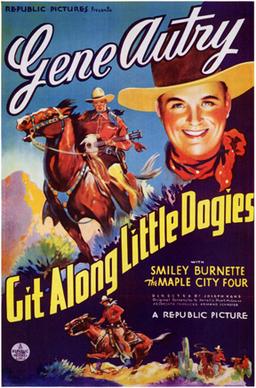
Git Along Little Dogies is a 1937 American Western film directed by Joseph Kane and starring Gene Autry, Smiley Burnette, and the Maple City Four. Written by Dorrell and Stuart E. McGowan, the film is about a singing cowboy who gets caught up in a war between oilmen and cattle ranchers, taking the side of the ranchers until he learns that oil will bring a railroad to town. The film is also known as Serenade of the West in the United Kingdom.
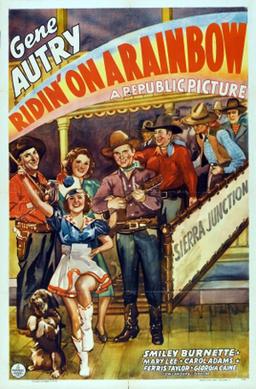
Ridin' on a Rainbow is a 1941 American Western musical film directed by Lew Landers and starring Gene Autry, Smiley Burnette, and Mary Lee. Written by Bradford Ropes and Doris Malloy, based on a story by Ropes, the film is about a singing cowboy whose investigation of a bank robbery takes him to a showboat, where he finds that a teenage singer's father has been working with the robbers to provide for her future. The film received an Academy Award nomination for best original song for "Be Honest with Me".

Melody Trail is a 1935 American Western film directed by Joseph Kane and starring Gene Autry, Ann Rutherford, and Smiley Burnette. Written by Sherman L. Lowe and Betty Burbridge, the film is about a singing cowboy who goes after the men who kidnapped the baby he should have been babysitting. The film features the songs "On the Melody Trail", "A Lone Cowboy on the Lone Prairie", and "Western Lullaby".

Mountain Rhythm is a 1939 American Western film directed by B. Reeves Eason and starring Gene Autry, Smiley Burnette, and June Storey. Based on a story by Connie Lee, the film is about a cowboy who organizes his fellow ranchers to oppose an Eastern promoter's land grab scheme.

Colorado Sunset is a 1939 American Western film directed by George Sherman and starring Gene Autry, Smiley Burnette, and June Storey. Written by Betty Burbridge and Stanley Roberts, based on a story by Luci Ward and Jack Natteford, the film is about a singing cowboy and his buddies who discover that the ranch they bought is really a dairy farm—and worse, it's subject to intimidation from a protection racket that prevents dairy products from safely reaching the market.

Rovin' Tumbleweeds is a 1939 American Western film directed by George Sherman and starring Gene Autry, Smiley Burnette and Mary Carlisle. Written by Betty Burbridge, Dorrell McGowan, and Stuart E. McGowan, the film is about a cowboy congressman who exposes a crooked politician who is delaying passage of a flood control bill.
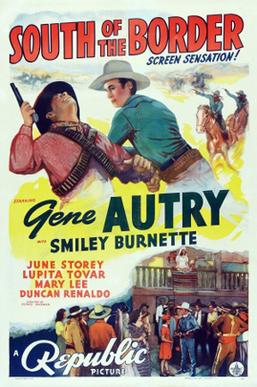
South of the Border is a 1939 Western film directed by George Sherman and starring Gene Autry, Smiley Burnette, and June Storey. Written by Betty Burbridge and Gerald Geraghty, based on a story by Dorrell and Stuart E. McGowan, the film is about a federal agent who is sent to Mexico to prevent foreign powers from gaining control of Mexican oil refineries and fomenting revolution among the Mexican people.
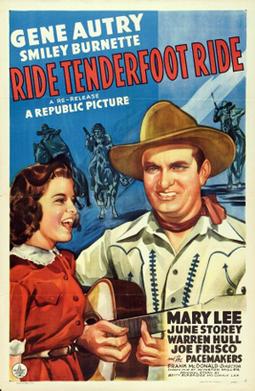
Ride, Tenderfoot, Ride is a 1940 American Western film directed by Frank McDonald and starring Gene Autry, Smiley Burnette, and June Storey. Written by Winston Miller, based on a story by Betty Burbridge and Connie Lee, the film is about a singing cowboy who inherits a meat-packing plant and must face stiff competition from a beautiful business rival.
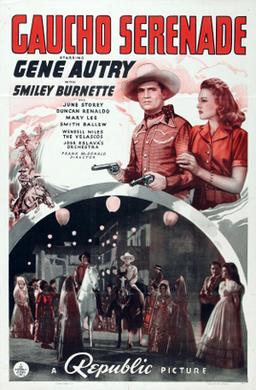
Gaucho Serenade is a 1940 American Western film directed by Frank McDonald and starring Gene Autry, Smiley Burnette, and June Storey. Written by Betty Burbridge and Bradford Ropes, the film is about a singing cowboy who goes up against a group of businessmen who plot to kidnap the son of a former partner so he won't testify against them.
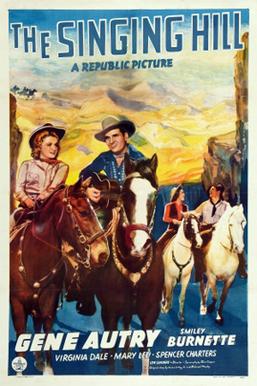
The Singing Hill is a 1941 American Western film directed by Lew Landers and starring Gene Autry, Smiley Burnette, and Virginia Dale. Based on a story by Jesse Lasky Jr. and Richard Murphy, the film is about a singing cowboy and foreman of a ranch that may be sold to an unscrupulous banker by the young madcap heiress who is unaware that the sale will result in the local ranchers losing their free grazing land and their ranches. In the film, Autry performed the 1940 song "Blueberry Hill", first recorded by Sammy Kaye, which would become a standard recorded by such artists as Louis Armstrong (1949), Fats Domino (1956), and Elvis Presley (1957). The song became one of Autry's best-selling recordings. In 1987, "Blueberry Hill" received an ASCAP Award for Most Performed Feature Film Standards on TV.

Back in the Saddle is a 1941 American Western film directed by Lew Landers and starring Gene Autry, Smiley Burnette, and Mary Lee. Written by Richard Murphy and Jesse Lasky Jr., the film is about a singing cowboy who attempts to bring peace between ranchers and the operator of a copper mine whose chemicals are poisoning the area's water supply. The film features several of Autry's hit songs, including "Back in the Saddle Again", "I'm An Old Cowhand", and "You Are My Sunshine".

Call of the Canyon is a 1942 American Western film directed by Joseph Santley and starring Gene Autry, Smiley Burnette, the Sons of the Pioneers, and Ruth Terry. Based on a story by Maurice Rapf and Olive Cooper, the film is about a singing cowboy who leads a group of cattlemen against the corrupt agent of a large packing company looking to swindle them by undercutting the buying price for beef. The film features three songs by Autry and the Sons of the Pioneers, including the classic "Take Me Back to My Boots and Saddle".
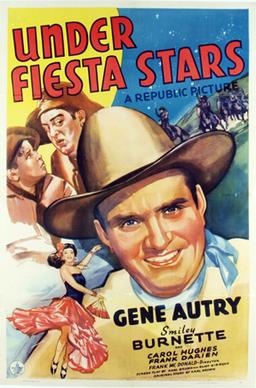
Under Fiesta Stars is a 1941 American Western film directed by Frank McDonald and starring Gene Autry, Smiley Burnette, and Carol Hughes. Based on a story by Karl Brown, the film is about a singing cowboy and rodeo champion who inherits a ranch and mining property along with his foster father's niece. She wants to sell but needs his consent, and he wants to work the mine according to his foster father's wishes. Problems arise when the niece unwittingly gets involved with unscrupulous lawyers who are plotting to steal the mine. The film features the songs "Purple Sage in the Twilight", "When You're Smiling", and the title song.

Sunset in Wyoming is a 1941 American Western film directed by William Morgan and starring Gene Autry, Smiley Burnette, George Cleveland, and Maris Wrixon. Based on a story by Joe Blair, the film is about a singing cowboy who goes up against a lumber company clearcutting the timber from a local mountain causing catastrophic flooding and endangering the lives of valley ranchers. The film features the songs "There's a Home in Wyomin'" and "Sing Me a Song of the Saddle".

Sierra Sue is a 1941 American Western film directed by William Morgan and starring Gene Autry, Smiley Burnette, and Fay McKenzie. Written by Earl Felton and Julian Zimet, the film is about a government inspector investigating a poisonous weed that is destroying the rangeland supporting the area's cattle. The inspector must persuade the ranchers to reject a plan to burn the land and support a new process of chemical spraying from an airplane. The film features the popular Autry songs "Be Honest With Me", "Ridin' the Range", and the title track.

Heart of the Rio Grande is a 1942 American Western film directed by William Morgan and starring Gene Autry, Smiley Burnette, Fay McKenzie, and Edith Fellows. Based on a story by Newlin B. Wildes, the film is about a singing cowboy and dude ranch foreman who helps a spoiled teenager and her business tycoon father discover what is most important in life. The film features the songs "Let Me Ride Down in Rocky Canyon", "Deep in the Heart of Texas", "Dusk on the Painted Desert", and "Rainbow In the Night" performed by Edith Fellows.




















